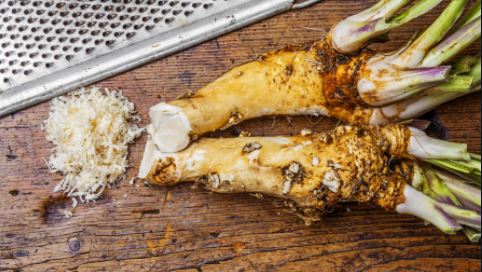Lifestyle
9 amazing health benefits of Horseradish root you should know

A popular condiment, horseradish tastes hot though it doesn’t have a lingering aftertaste. It originated in south-eastern Europe, and eventually spread all over the world.
And research has revealed quite a number of interesting facts about this root, which is why you need to keep reading.
Other compounds in horseradish, namely glucosinolate and sinigrin, also possess chemopreventive effects.
The root contains several other antioxidants that treat respiratory disorders like mucus and sinusitis. They also help combat bacterial infections, including that of the urinary tract.
And like we said, there are several other ways horseradish can do wonders for your health. Here are 9 benefits of this root for overall health:
1. Is an antioxidant powerhouse
Horseradish root possesses several phytocompounds, types of antioxidants that are extremely beneficial to human health. Some other antioxidants in horseradish are antimutagenic, which means that they can protect the body from mutagens that otherwise inflict grave harm.
2. Can help treat urinary tract infections
The antibiotic properties of horseradish can help treat urinary tract infections in some cases, better than conventional treatment. Another reason horseradish works well in this aspect is sinigrin, the compound we spoke of initially. Sinigrin is an effective diuretic and prevents water retention, and this helps deal with urinary tract infections.
3. Enhances digestion
Certain enzymes in the root can stimulate digestion and aid bowel movements. Horseradish root is also considered a cholagogue, i.e., it stimulates bile production in the gallbladder – thereby aiding digestion.
And the little fiber in the root can also improve digestion.
4. Fights inflammation
One Italian study states that horseradish can help fight inflammation – it achieves this by reducing the release of reactive oxygen species. Several parts of Chinese medicine have recommended the use of horseradish to help prevent inflammation – be it in the case of injury or even for relief from arthritis pains.
5. Eases respiratory ailments
The antibiotic properties of the root can play a major role in treating respiratory ailments. In fact, traditional medicine has seen the use of horseradish root for treating bronchitis, cough, common cold, and sinusitis.
6. Has antimicrobial properties
It is the allyl isothiocyanate in the root that offers antimicrobial properties. Studies have shown that this compound can offer protection against a variety of microbes. And in yet another study, roast beef added with horseradish essential oil displayed the most resistance against bacterial growth.
The antimicrobial properties of horseradish also help in the treatment of ear infections.
7. Helps treat melasma
Melasma is a condition where brown patches appear on the face. But since horseradish root has bleaching properties, it can help treat skin discoloration – which is the primary symptom of melasma.
You can simply cut the horseradish root into slices and rub one directly on your skin. Ensure the juice of the root is applied to the affected areas. You can allow it to dry and then rinse with lukewarm water and pat dry. Repeat once a week until the brown patches fade.
8. Horseradish can help reduce age spots
The skin-lightening properties of horseradish have a role to play here.
You can grate a four-inch piece of horseradish and mix it with a quarter cup of apple cider vinegar. Allow the mixture to sit for about two weeks, post which you strain it. Using a cotton ball, apply it to the affected areas. Follow this remedy thrice a day for about a month.
9. Can boost hair growth
Though there is little research on this, some sources say that the antioxidants in horseradish help regenerate hair and prevent hair loss. They achieve this by improving circulation to the scalp.
Simply prepare a poultice from horseradish and apply to your scalp. Leave it on for about 20 minutes and then shampoo as usual.






